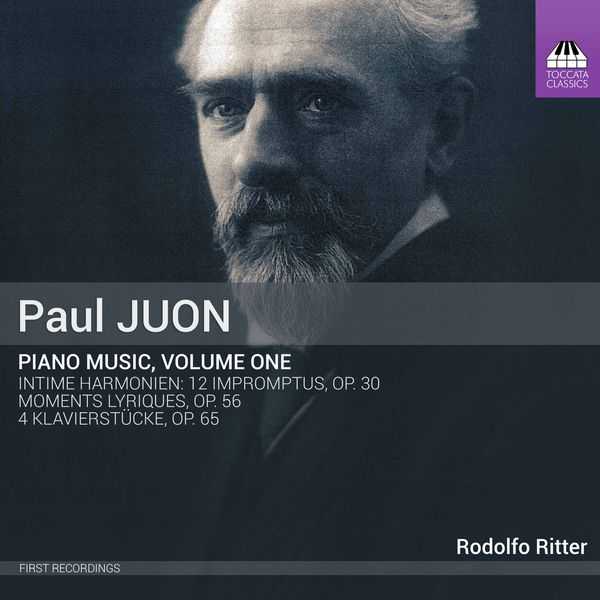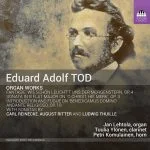

Composer: Paul Juon
Performer: Rodolfo Ritter
Format: FLAC (tracks)
Label: Toccata
Catalogue: TOCC0290
Release: 2017
Size: 0.98 GB
Recovery: +3%
Scan: cover
4 Stücke, Op. 65
01. No. 1, Heitere Weise
02. No. 2, Schlummerlied
03. No. 3, Exotisches Intermezzo
04. No. 4, Tanz
12 Impromptus, Op. 30 “Intime Harmonieen”
05. No. 1, Wogen
06. No. 2, Episode
07. No. 3, Elfchen
08. No. 4, Romantisches Wiegenlied
09. No. 5, Sonderbare Humoreske
10. No. 6, Intermezzo
11. No. 7, Es geht die Sage
12. No. 8, Kleine Tarantelle
13. No. 9, Sphinx
14. No. 10, Narretei
15. No. 11, Ruhige Liebe
16. No. 12, Zu Grabe tragen
Moments lyriques, Op. 56
17. No. 1, Menuet
18. No. 2, Élégie
19. No. 3, Intermezzo
20. No. 4, Intimité
21. No. 5, Bagatelle
22. No. 6, Nostalgie
23. No. 7, Étude
24. No. 8, Berceuse
25. No. 9, Cortège
The Russian-born German-Swiss composer Paul Juon (1872–1940) produced a generous amount of piano music – no fewer than 35 opus numbers – that has yet to be explored in any detail. This first instalment of the first-ever survey of his piano music reveals a composer close to his Russian roots but also alive to the music of his own time. His style has much in common with Medtner and Rachmaninov, both friends from student days, but with a harmonic freedom that suggests Debussy. His inventive use of rhythm calls on folk influences from Azerbaijan, Armenia and elsewhere. This release is the first of a series of collaborations between Toccata Classics and Mexican musicians.
No, no, Paul Juon isn’t a Hispanic composer, despite what his name may suggest. In fact, he was born Павел Фёдорович Юон, meaning Pavel Fiodorovitch Juon or, closer to the transliteration, Youon, even though he was born in a Swiss family living in Russia for professional reasons. Nicknamed “the Russian Brahms”, he was a classmate of Rachmaninoff in Moscow before moving to Berlin, where Joachim appointed him composition professor at the Musikhochschule. In 1934, despite the honours received throughout his career, he had to leave Germany and return to Switzerland, the land of his ancestors, where he died in 1940, forgotten by the Russians who saw in him a German defector and a character of the former regime, and also forgotten by the Germans who most likely saw in him… a Russian. Sad and cruel fate for such a dignified composer and author of a substantial chamber music repertoire, several symphonic works, Lieder, an Aleko opera (much like you know who, his classmate!), and a corpus of piano pieces, from which is here the recording of the first volume. Besides his Brahms heritage, Juon’s musical language also benefits from the influence of Chopin and Schumann, as well as from the French music of his time – his Moments lyriques (Lyrical Moments) date back to the years 1915, meaning Debussy and Ravel are probably not too far. Mexican pianist Rodolfo Ritter, who has a fondness for deviating from beaten tracks and even more beaten programmes, officiates with the unmistakable pleasure of treating us to such rarities.



